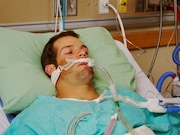27-item questionnaire found to be valid clinical tool for assessing PICS
THURSDAY, Jan. 3, 2019 (HealthDay News) — The self-report version of the Healthy Aging Brain Care Monitor is valid for assessing post-intensive care syndrome (PICS), according to a study published in the January issue of the American Journal of Critical Care.
Sophia Wang, M.D., from the Indiana University School of Medicine in Indianapolis, and colleagues validated the self-report version of the Healthy Aging Brain Care Monitor for 142 patients who survived a stay in an intensive care unit. Participants completed the Healthy Aging Brain Care Monitor Self-Report and standardized assessments of cognition, psychological symptoms, and physical functioning.
The researchers observed good to excellent internal consistency on the total scale and all subscales (Cronbach’s α, 0.83 to 0.92). There was a strong correlation for scores on the psychological subscale with standardized measures of psychological symptoms (Spearman correlation coefficient, 0.68 to 0.74). There was a correlation for results on the cognitive subscale with the delayed memory measure (−0.51). Physical subscale scores correlated with the Physical Self-Maintenance Scale (−0.26). Significantly worse scores on subscales and total scores on the Healthy Aging Brain Care Monitor were seen for patients with PICS versus primary care patients.
“Most intensive care unit survivors return to a primary care provider for post-hospital care, and health care professionals with little to no expertise in PICS need an easy-to-use tool to recognize when patients are experiencing symptoms related to their critical illness,” Wang said in a statement.
Copyright © 2018 HealthDay. All rights reserved.








